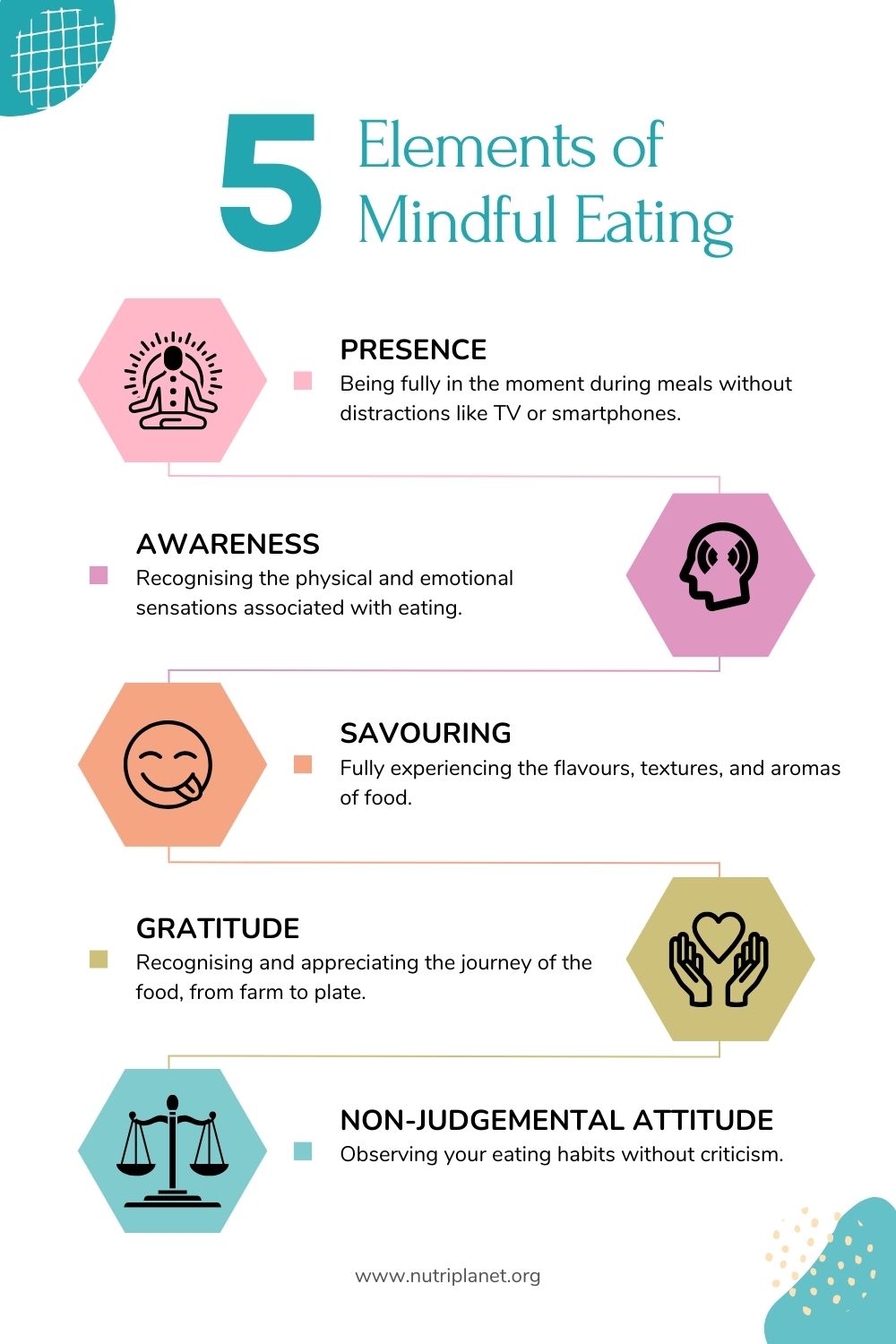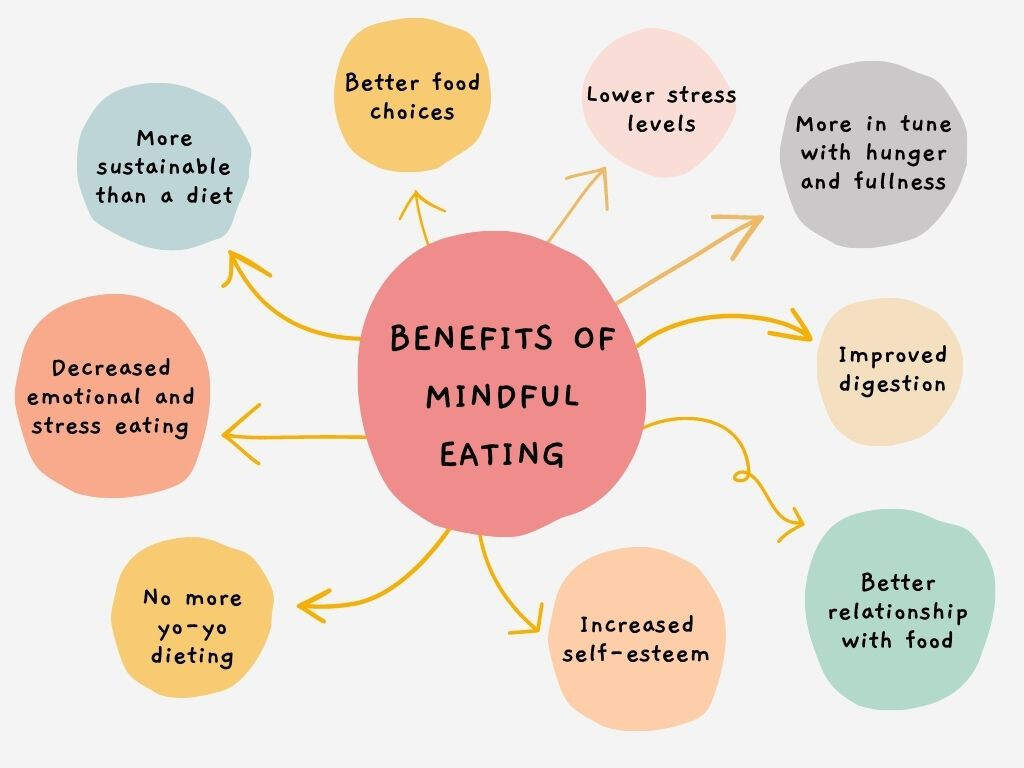Nourishing the Soul: The Practice of Mindful Eating
Understanding the Art of Mindful Eating
In today's fast-paced world, where hectic schedules and endless distractions are the norm, the simple act of eating has become more of a rushed task than a mindful practice. Mindful eating, however, offers a refreshing approach to nourishing our bodies and minds. It is a practice deeply rooted in the present moment, where every bite is savored, and every sensation is acknowledged.
Mindful eating can be defined as the practice of being fully present and engaged while consuming food. It involves paying attention to the colors, textures, smells, and flavors of the food we eat, as well as the sensations that arise within our bodies before, during, and after eating. This practice encourages us to cultivate a greater awareness of our body's hunger and fullness cues, as well as our emotional and psychological relationship with food.

In today's blog post, we will explore the art of mindful eating and its significance in promoting overall well-being. We will delve into the benefits of adopting a mindful approach to eating, as well as practical tips and techniques to incorporate mindful eating into your daily life. By embracing mindful eating, we can foster a deeper connection with our food, our bodies, and ourselves, ultimately leading to greater health, happiness, and satisfaction.
Origin and Core Principles of Mindful Eating
OriginMindful eating has its roots in ancient Buddhist teachings, particularly the practice of mindfulness. The concept of mindfulness involves being fully present and aware in every moment of life, including meal times. In Buddhist traditions, eating is considered an opportunity to cultivate mindfulness and gratitude for the nourishment provided by food.
Core Principles
Present Moment Awareness: Mindful eating involves being fully present and engaged in the experience of eating. It means paying attention to the sensory aspects of food—its taste, texture, smell, and appearance—without distraction.
Non-Judgmental Awareness: Mindful eating encourages a non-judgmental attitude towards food and eating habits. Instead of labeling foods as "good" or "bad," individuals practice acceptance and self-compassion in their relationship with food.
Listening to Hunger Cues: Mindful eating emphasizes tuning into the body's hunger and satiety cues. Rather than eating out of habit, boredom, or emotional triggers, individuals learn to eat when they are hungry and stop when they are satisfied.
Savoring the Experience: Mindful eating encourages savoring each bite of food, allowing oneself to fully enjoy the flavors and textures. By eating slowly and mindfully, individuals can derive greater satisfaction from their meals and prevent overeating.
Awareness of Emotional Triggers: Mindful eating involves recognizing emotional triggers that may lead to unhealthy eating habits, such as stress, boredom, or anxiety. By bringing awareness to these triggers, individuals can develop healthier ways of coping with emotions without resorting to food.
Gratitude and Appreciation: Mindful eating promotes a sense of gratitude and appreciation for the food on the plate, as well as for the individuals involved in its production and preparation. Practicing gratitude enhances the enjoyment of meals and fosters a deeper connection to food and its origins.
Mindful Decision-Making: Mindful eating extends beyond the act of eating itself to encompass mindful decision-making about food choices. Individuals are encouraged to make conscious choices based on nutritional value, taste preferences, and hunger cues.

By embracing these core principles, individuals can cultivate a more balanced and harmonious relationship with food, leading to improved physical, emotional, and psychological well-being. Mindful eating is not about strict dietary rules or restrictions but rather about developing a mindful and intuitive approach to nourishing the body and soul.
Benefits of Mindful Eating
1. Improved Digestion and Nutrient Absorption: Mindful eating encourages slower, more deliberate chewing and digestion, which can enhance nutrient absorption and alleviate digestive discomforts like bloating and indigestion.2. Weight Management: Research suggests that mindful eating practices, such as paying attention to hunger and fullness cues, can contribute to weight management and prevent overeating. A study published in the Journal of the Academy of Nutrition and Dietetics found that individuals who practiced mindful eating techniques experienced improvements in weight-related outcomes.
3. Enhanced Satisfaction and Enjoyment: By savoring each bite and fully engaging in the eating experience, individuals can derive greater satisfaction and enjoyment from their meals. This heightened awareness of flavors and textures can lead to a more fulfilling dining experience.
4. Increased Awareness of Hunger and Fullness: Mindful eating promotes tuning into the body's hunger and fullness signals, allowing individuals to better recognize when they are truly hungry and when they are comfortably satisfied. This awareness helps prevent mindless snacking and unnecessary calorie consumption.
5. Better Food Choices: When practicing mindful eating, individuals become more attuned to their body's nutritional needs and preferences. This heightened awareness can lead to better food choices, as individuals are more likely to select nutrient-dense foods that nourish the body and support overall health.
6. Portion Control: Mindful eating encourages moderation and portion control by promoting mindful decision-making about serving sizes. By paying attention to portion sizes and eating slowly, individuals can prevent overeating and maintain a healthy balance between food intake and energy expenditure.
7. Reduced Emotional Eating: Mindful eating involves cultivating awareness of emotional triggers that may lead to overeating, such as stress, boredom, or sadness. By recognizing these triggers, individuals can develop healthier coping mechanisms and reduce reliance on food for emotional comfort.
8. Increased Mindfulness in Daily Life: The practice of mindful eating extends beyond meal times to foster a greater sense of mindfulness in daily life. By incorporating mindfulness into eating habits, individuals develop a more mindful approach to all aspects of life, including stress management, decision-making, and interpersonal relationships.
By incorporating mindful eating practices into daily life, individuals can experience a wide range of benefits that contribute to improved physical, emotional, and psychological well-being. Research continues to highlight the positive effects of mindful eating on various aspects of health and quality of life.
Techniques for Practicing Mindful Eating
Engage Your Senses: Before taking a bite, take a moment to observe the appearance, aroma, and texture of your food. Notice the colors, shapes, and arrangement of ingredients on your plate. As you begin eating, pay attention to the flavors, textures, and temperatures of each bite.
Chew Slowly and Thoroughly: Take the time to chew each bite slowly and thoroughly, savoring the taste and texture of your food. Aim to chew each mouthful at least 20-30 times before swallowing. This not only aids digestion but also allows you to fully experience the flavors and sensations of your meal.
Chew Slowly and Thoroughly: Take the time to chew each bite slowly and thoroughly, savoring the taste and texture of your food. Aim to chew each mouthful at least 20-30 times before swallowing. This not only aids digestion but also allows you to fully experience the flavors and sensations of your meal.
Pause Between Bites: After swallowing a mouthful of food, pause briefly before taking the next bite. Use this moment to check in with your body and assess your level of hunger and fullness. Notice any changes in your appetite and how your body responds to the food you've eaten so far.
Listen to Your Body: Tune into your body's hunger and fullness signals throughout the meal. Eat slowly and mindfully, stopping when you feel comfortably satisfied rather than overly full. Pay attention to subtle cues of hunger and satiety, such as stomach rumblings or changes in energy levels.
Practice Gratitude: Cultivate a sense of gratitude for the nourishment your food provides. Take a moment to express gratitude for the effort that went into preparing your meal, as well as the nourishment it offers your body and mind. This can help foster a more positive and mindful relationship with food.
Mindful Breathing: Incorporate mindful breathing exercises into your mealtime routine to promote relaxation and focus. Before beginning your meal, take a few deep breaths to center yourself and bring your attention to the present moment. Continue to breathe mindfully as you eat, allowing each breath to anchor you in the present experience.
Stay Present: Practice staying present and attentive throughout the entire eating process. Avoid rushing through your meal or multitasking while eating. Instead, focus your attention on the sensations of eating, moment by moment, without judgment or distraction.
By incorporating these techniques into your daily eating habits, you can cultivate a greater sense of mindfulness and awareness around food. Over time, mindful eating can become a natural and enjoyable practice that enhances your overall well-being and satisfaction with meals.
Mindful Eating and Emotional Well-Being
Practicing mindful eating can have profound effects on emotional well-being, helping individuals develop a healthier relationship with food and manage emotional eating patterns. Research suggests that mindful eating techniques can promote greater self-awareness, reduce stress, and enhance overall emotional resilience. Heightened Self-Awareness: Mindful eating encourages individuals to tune into their thoughts, emotions, and bodily sensations while eating. By cultivating greater self-awareness, individuals become more attuned to their internal cues of hunger, satiety, and emotional triggers for eating. This heightened awareness enables them to make conscious choices about when, what, and how much to eat, leading to a more balanced and intuitive approach to eating.
Reduced Stress and Anxiety: Mindful eating practices incorporate elements of mindfulness meditation, such as deep breathing and present-moment awareness. These techniques help individuals cultivate a state of relaxation and calmness during meals, reducing stress and anxiety associated with food and eating. Research has shown that mindfulness-based interventions can effectively reduce symptoms of anxiety and improve overall psychological well-being.
Enhanced Emotional Regulation: Mindful eating encourages individuals to approach food with a non-judgmental and compassionate attitude. Rather than using food as a coping mechanism for stress or emotional distress, individuals learn to respond to their emotions with mindfulness and self-compassion. This can help break the cycle of emotional eating and promote healthier ways of coping with difficult emotions.

Improved Body Image: Mindful eating emphasizes self-acceptance and body respect, regardless of size or shape. By focusing on the sensory experience of eating and honoring their body's hunger and fullness cues, individuals develop a more positive and accepting relationship with their bodies. This shift in perspective can lead to greater body satisfaction and improved body image over time.
Numerous studies have explored the relationship between mindful eating and emotional well-being, with promising results. For example, a systematic review published in the Journal of Obesity found that mindfulness-based interventions, including mindful eating, were associated with reductions in emotional eating and improvements in psychological well-being among participants.

By integrating mindful eating practices into their daily lives, individuals can cultivate greater emotional resilience, reduce stress-related eating, and develop a healthier relationship with food and their bodies. Mindful eating offers a holistic approach to nourishing both body and mind, promoting overall emotional well-being and vitality.
As we've explored in this blog post, mindful eating offers a myriad of benefits, from promoting healthier food choices and portion control to enhancing our emotional resilience and overall well-being. By practicing mindful eating, we can break free from the cycle of dieting and deprivation, and instead, embrace a balanced and intuitive approach to eating.
So, let's pause, take a deep breath, and savor the nourishment that each meal brings. Let's savor the flavors, textures, and sensations of our food, and let them nourish not only our bodies but also our souls. Let's approach eating with mindfulness, compassion, and gratitude, knowing that each mindful bite is a step towards greater health, happiness, and harmony.
Incorporate mindful eating into your daily life, and witness the profound transformation it can bring. Bon appétit!
Incorporate mindful eating into your daily life, and witness the profound transformation it can bring. Bon appétit!
















Comments
Post a Comment